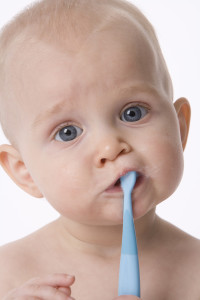 By: Dr. Elizabeth Eggert
By: Dr. Elizabeth Eggert
Did you know your child’s teeth start developing 6 weeks after conception? While baby teeth may not appear until your child is 6 months old, a lot of oral development occurs well before your child reaches that milestone. Here’s what you need to know about your child’s teeth from birth to age six.
Birth to Two Years
Your child is born with a complete set of baby, or primary, teeth under the gums. Typically around 6 months of age, your child’s lower central incisors—their lower front teeth—erupt as a pair, followed approximately a month later by the upper central incisors. Lateral incisors, cuspids, and first and second molars erupt in pairs over the next 18 months until your child has a complete set of primary teeth before the age of three.
As parents know well, erupting teeth can make for cranky kids. Gums are often tender and sore, and the discomfort can cause your child to become irritable, have trouble sleeping, and can increase drooling, chewing, and sucking. You may notice your child rubbing their face or grabbing their ears, too. Gently rubbing your child’s gums with a clean, damp cloth or gauze or a chilled teething ring can be comforting.
Two Years to Six Years
Your child’s primary teeth serve several essential purposes, which is why it’s important to keep them clean and healthy. Primary teeth serve as placeholders for the permanent teeth forming below them. Keeping primary teeth healthy helps your child’s permanent teeth develop appropriately. Primary teeth also help your child chew and process healthy foods, promoting good nutrition and eating habits.
It’s important your child receive regular dental recare visits while they have their primary teeth. Schedule your child’s first appointment as soon as you see the first tooth appear and no later than their first birthday. At their first visit at Eggert Family Dentistry, we’ll give your child a complete oral exam, clean their teeth, and discuss teething, pacifier use, thumb-sucking, and tips for keeping your child’s teeth clean and healthy between visits.
Home Care for Primary Teeth
Care of your child’s primary teeth begins before they even start to erupt. After each feeding, wipe your infant’s gums with a clean, damp cloth or gauze. When teeth appear, switch to a child-sized toothbrush to clean the teeth and ask us for a recommendation for an infant-safe toothpaste, generally a fluoride-free toothpaste until your child can fully spit the excess toothpaste into the sink. Begin flossing for your child as soon as two or more teeth touch. Most children cannot floss properly by themselves until age 10 or 11.
Just like permanent teeth, primary teeth are susceptible to decay when they come into contact with sugary, sticky, or acidic substances such as juice, soda, and honey. We recommend you avoid giving your young children sugary drinks and transition your children to small, open cups after their first birthdays. Replace sweet snacks with vegetables, fruits, and whole grains.
The Eggert Family Dentistry team is passionate about developing healthy habits in young children. Our team members are trained to provide safe, fun, and educational dental appointments for children and their parents. Schedule your child’s first or next dental appointment today.